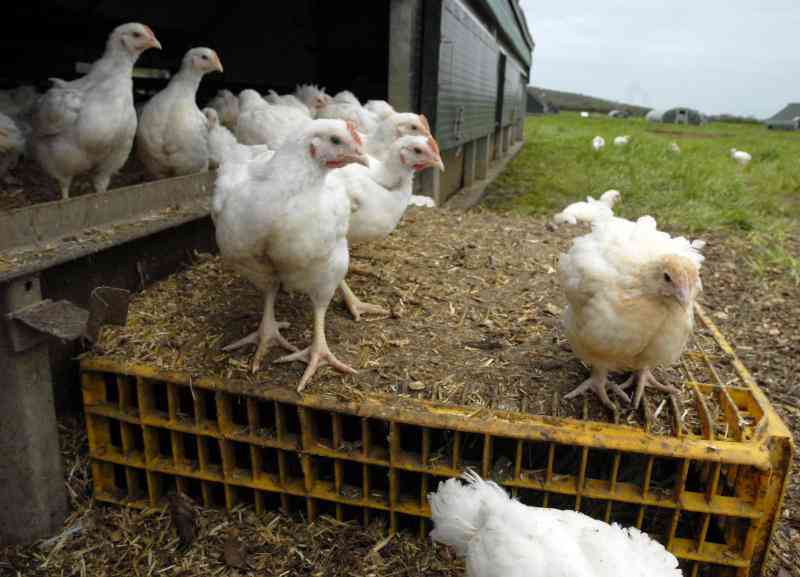
These are all measures put in place in the poultry site to ensure that your flocks are protected from disease- causing organisms. [WSPA]
Achieving good broiler health is the desire of every poultry keeper.
From early life through to growing and finishing, broilers will typically experience common intestinal, respiratory, skeletal problems and immunological effects that will primarily affect their growth rates, livability and ultimately farmers' profitability.
But is it true that farmers have limited alternatives but to depend on the use of antimicrobials to fight all these challenges? I beg to differ.
Over the years, I have encountered commercial farmers keeping more than 200 broiler birds at a go rearing them without the use of any antibiotics with acceptable mortality of less than 3 per cent. Here are five strategies to reduce the use of antibiotics on your farm.
Choose the right genetics and good chick qualityMost high first week mortalities are linked to poor hatchery sanitation and diseased parent flocks, flocks with low maternal immunity, or outright second or third generation chicks. Have a conversation with your chick supplier and buy high quality chicks with repeatable good traits like livability, good feed conversion ratio, disease resistance and high daily body weight gains.
Cleaning and disinfection before placing your birdsA good start is a clean start. Bacteria and viruses can survive in the environment for a long time. After flock depopulation, the units must be washed and disinfected thoroughly to prevent contamination of the units with pathogens of the previous flock.
Thoroughly dry clean your units by removing old manure, dust and feathers. Sweep, collect and bury these wastes at least one kilometre away from the unit or farm. The old manure is the natural breeding ground for worms, coccidia, microorganisms like E. coli, staphylococcus and Gumboro-causing virus. Wash the chicken house with plenty of water focusing on the walls, roof, equipment like feeders and waterers. About 95 per cent of the micro-organisms are removed by water alone using high pressure washer like car wash pumps. Choose the right disinfectant with good killing properties and apply accordingly.
Optimise your brooding conditionsPrepare the barns 24 hours before the arrival of the chicks by heating up the room to fulfill temperature parameters on time. Keep your concrete floor at temperature of 28 degrees centigrade. Note that if the floor is not warm enough before litter distribution, chicks will be chilled when they lie down on the floor material. Once the chicks have arrived, keep the temperature at 33 to 35 degrees centigrade for first week and gradually decrease by 3 degrees centigrade every week. The most critical period in poultry farming is the brooding stage. Provide a comfortable environment for organ development, growth, and immunity establishment during this critical period by maintaining minimum ventilation and minimising built-up of toxic ammonia gases. Protecting these birds from chilling and over temperatures is critical for the first three weeks of life.
Feed and waterA good quality feed that is optimally balanced and adequately supplied is paramount for a good start. Provide clean and fresh potable water all the time. The water should be chlorinated all the time.
BiosecurityThese are all measures put in place in the poultry site to ensure that your flocks are protected from disease-causing organisms. It is the cheapest and more effective means of disease control. Your flock units should be located away from other poultry houses and should be managed in an 'all-in-all out' principle. Keep the site fenced, do not allow unnecessary visitors into your flock house. If they must get in, ensure they wear a clean uniform and boots. Keep your unit's rodent and wild bird-proof by having chicken wire netting and rat bait.
Finally, ensure that you routinely vaccinate your birds as advised by your local veterinarian and report any ill health to your vet.
[The writer is Head Vet at Kenchic, [email protected]]
 The Standard Group Plc is a multi-media organization with investments in media
platforms spanning newspaper print
operations, television, radio broadcasting, digital and online services. The
Standard Group is recognized as a
leading multi-media house in Kenya with a key influence in matters of national and
international interest.
The Standard Group Plc is a multi-media organization with investments in media
platforms spanning newspaper print
operations, television, radio broadcasting, digital and online services. The
Standard Group is recognized as a
leading multi-media house in Kenya with a key influence in matters of national and
international interest.
